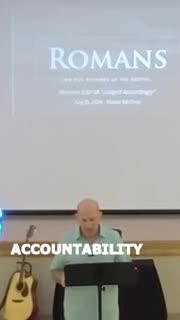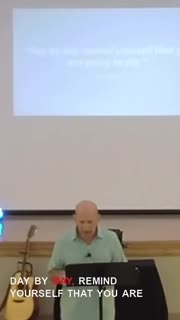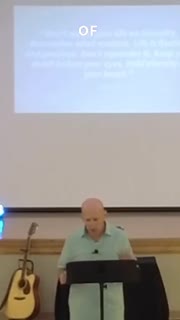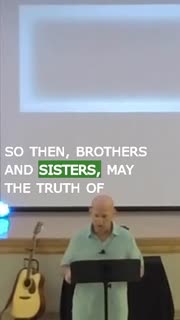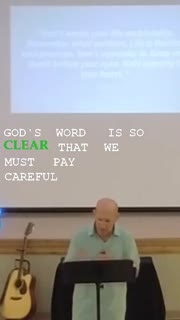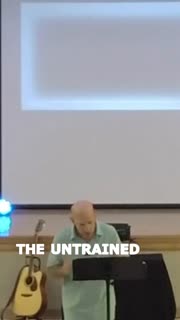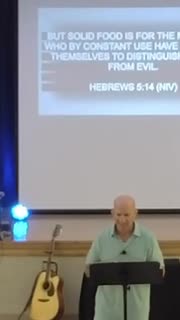Living with Accountability: Embracing God's Impartial Judgment
Devotional
Sermon Summary
Bible Study Guide
Sermon Clips
### Quotes for Outreach
1. "Accountability before God for how we live is one of life's most important principles. Anyone who lives without regard for how God will judge them in the end is living, quite frankly, is just living dangerously." [00:58] (17 seconds)
2. "Day by day, remind yourself that you are going to die. Because if you live in light of that, you will probably live more wisely than if you think you will live forever." [01:41] (14 seconds)
3. "Most of us would probably admit, that we are over-distracted most of the time. And if there was a topic we'd probably prefer to be distracted from, it would be this topic, judgment that we'll face one day before God. But the stakes are so high, brothers and sisters. They're so high." [02:25] (20 seconds)
4. "The bottom line and most important aspect of judgment is how each person responds very simply to the truth that they had. Some are on some island and all they have is the truth of God in creation. And Paul said, God has made it clear to everyone at all times in all places so that no one is without excuse." [34:26] (24 seconds)
5. "So then, brothers and sisters, may the truth of his word be our standard and our guide and our final authority on all things. May we share it knowing that we will not accept it, knowing that all will not accept it. Everyone's not going to accept it, but that it's principles even." [35:59] (19 seconds)
### Quotes for Members
1. "God's word is so clear that we must pay careful attention and consider God's impartial judgment, which is the title of this message. Impartial judgment. So far in Romans 2, the Apostle Paul has made, clear that one, the judgment of God will be righteous. So it'll be righteous. It will be according to what we've actually done in truth." [03:09] (21 seconds)
2. "The untrained conscience is not reliable. And actually, what we really need, we need to be trained in the truth, right? It is the truth that sets us free, ultimately. And the context for Jesus saying that in John chapter 8 was the untapped conscience. These new disciples, these new Jewish converts, if you will, new Jewish followers of Jesus. Jesus said, you will know the truth after you're studying it and digging into it." [15:58] (31 seconds)
3. "Solid food, brothers, and sisters, is the gospel that is welcomed, believed, and then lived. Like, there's no deeper level of faith. There's no, there's no second tier Christian. There's no, oh, now, like, it's, it's, I receive the gospel and I'm living by it or I'm living by my emotions or my feelings or I'm immature in my faith." [25:37] (33 seconds)
4. "The bottom line and most important aspect of judgment is how each person responds very simply to the truth that they had. Some are on some island and all they have is the truth of God in creation. And Paul said, God has made it clear to everyone at all times in all places so that no one is without excuse." [34:26] (24 seconds)
5. "So then, brothers and sisters, may the truth of his word be our standard and our guide and our final authority on all things. May we share it knowing that we will not accept it, knowing that all will not accept it. Everyone's not going to accept it, but that it's principles even." [35:59] (19 seconds)
Ask a question about this sermon
1. "Accountability before God for how we live is one of life's most important principles. Anyone who lives without regard for how God will judge them in the end is living, quite frankly, is just living dangerously." [00:58] (17 seconds)
2. "Day by day, remind yourself that you are going to die. Because if you live in light of that, you will probably live more wisely than if you think you will live forever." [01:41] (14 seconds)
3. "Most of us would probably admit, that we are over-distracted most of the time. And if there was a topic we'd probably prefer to be distracted from, it would be this topic, judgment that we'll face one day before God. But the stakes are so high, brothers and sisters. They're so high." [02:25] (20 seconds)
4. "The bottom line and most important aspect of judgment is how each person responds very simply to the truth that they had. Some are on some island and all they have is the truth of God in creation. And Paul said, God has made it clear to everyone at all times in all places so that no one is without excuse." [34:26] (24 seconds)
5. "So then, brothers and sisters, may the truth of his word be our standard and our guide and our final authority on all things. May we share it knowing that we will not accept it, knowing that all will not accept it. Everyone's not going to accept it, but that it's principles even." [35:59] (19 seconds)
### Quotes for Members
1. "God's word is so clear that we must pay careful attention and consider God's impartial judgment, which is the title of this message. Impartial judgment. So far in Romans 2, the Apostle Paul has made, clear that one, the judgment of God will be righteous. So it'll be righteous. It will be according to what we've actually done in truth." [03:09] (21 seconds)
2. "The untrained conscience is not reliable. And actually, what we really need, we need to be trained in the truth, right? It is the truth that sets us free, ultimately. And the context for Jesus saying that in John chapter 8 was the untapped conscience. These new disciples, these new Jewish converts, if you will, new Jewish followers of Jesus. Jesus said, you will know the truth after you're studying it and digging into it." [15:58] (31 seconds)
3. "Solid food, brothers, and sisters, is the gospel that is welcomed, believed, and then lived. Like, there's no deeper level of faith. There's no, there's no second tier Christian. There's no, oh, now, like, it's, it's, I receive the gospel and I'm living by it or I'm living by my emotions or my feelings or I'm immature in my faith." [25:37] (33 seconds)
4. "The bottom line and most important aspect of judgment is how each person responds very simply to the truth that they had. Some are on some island and all they have is the truth of God in creation. And Paul said, God has made it clear to everyone at all times in all places so that no one is without excuse." [34:26] (24 seconds)
5. "So then, brothers and sisters, may the truth of his word be our standard and our guide and our final authority on all things. May we share it knowing that we will not accept it, knowing that all will not accept it. Everyone's not going to accept it, but that it's principles even." [35:59] (19 seconds)
